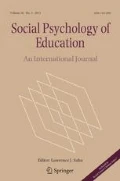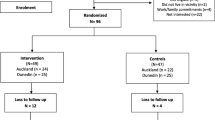Abstract
The purpose of this study was to conduct an intervention to change attitudes toward obese individuals. Ninety-five Kinesiology undergraduates conducted a FITNESSGRAM service-learning project with school-aged children. They completed anti-fat attitude test (AFAT) and explicit attitude assessments before and after the intervention. The results indicated participants had anti-fat bias toward obese individuals on the lazy/motivated scale, but not on the other four scales on pre measurements. Their anti-fat attitudes concerning whether people are responsible for their weight were significantly reduced through the intervention. Five themes emerged from the undergraduates’ reflective papers that support the efficacy of the intervention: Healthy lifestyle—an individual choice, barriers to physical activity, multi-factorial nature of obesity, and promotion of physical activity through information and encouragement. The findings partially support experiential learning as a potential mechanism to reduce individuals’ anti-fat attitudes.
Similar content being viewed by others
References
Allison, K.R., Dwyer, J.J.M, Goldenberg, E., Fein, A., Yoshida, K.K., Boutillier, M. (2005). Male reasons for participating in physical activity, barriers to participation, and suggestions for increasing participation. Adolescence, 40, 155–170
Bauer, K.W., Patel, A., Prokop, L.A., Austin, S.B. (2006). Swimming upstream: Faculty and staff members from urban middle schools in low-income communities describe their experience implementing nutrition and physical activity initiatives. Preventing Chronic Disease, 3, 1–9
Bell, S.K., Morgan, M.B. (2000). Children’s attitudes and behavioral intentions toward a peer presented as obese: Does a medical explanation make a difference?. Journal of Pediatric Psychology, 25, 137–145
Bosch, J., Stradmeijer, M., Seidell, J. (2004). Psychosocial characteristics of obese children/youngsters and their families: Implications for preventive and curative interventions. Patient Education and Counseling, 55, 353–362
Bringle, R.G., Kremer, K.F. (1993). Evaluation of intergenerational service-learning project for undergraduates. Educational Gerontology, 19, 407–417
Chambliss, H.O., FinleyC.E. Blair, S.N. (2004). Attitudes toward obese individuals among exercise science students. Medicine and Science in Sports and Exercise, 36, 468–474
Crandall, C.S. (1994). Prejudice against fat people: Ideology and self-interest. Journal of Personality and Social Psychology, 66, 882–894
Crandall, C.S., D’Anello, S., Sakalli, N., Lazarus, E., Nejtardt, G.W., Feather, N.T. (2001). An attribution-value model of prejudice: Anti-fat attitudes in six nations. Personality and Social Psychology Bulletin, 27, 30–37
Cronbach, L.J. (1951). Coefficient alpha and the internal structure of tests. Psychometrika, 16, 297–334
Eagly, A. H., & Chaiken, S. (1998). Attitude structure and function. In D. T. Gilbert, S. T. Fiske, & G. Lindzey (Eds.), The handbook of social psychology (4th ed. pp. 369–322). New York: McGraw-Hill.
Faith, M. S., Leone, M. A., Ayers, T. S., Heo, M., & Pietrobelli, A. (2002). Weight criticism during physical activity, coping skills, and reported physical activity in children. Pediatrics, 110, e23.
Friedman, K.E., Reichmann, S.K., Costanzo, P.R., Zelli, A., Ashmore, J.A., Musante, G.J. (2005). Weight stigmatization and ideological beliefs: Relation to psychological functioning in obese adults. Obesity Research, 13, 907–916
Greenburg, B.S., Eastin, M., Hofschire, L., Lachlan, K., Brownell, K.D. (2003). Protrayals of overweight and obese individuals on commercial television. American Journal of Public Health, 93, 1342–1348
Greenleaf, C., Weiller, K. (2005). Perceptions of youth obesity among physical educators. Social Psychology of Education, 8, 407–423
Greenwald, A.G., Banaji, M.R. (1995). Implicit social cognition: Attitudes, self-esteem, and stereotypes. Psychological Review, 102, 4–27
Hague, A.L., White, A.A. (2005). Web-based intervention for changing attitudes of obesity among current and future teachers. Journal of Nutritional Education and Behavior, 37, 58–66
Harris, M.B., Walters, L.C., Waschull, S. (1991). Altering attitudes and knowledge about obesity. The Journal of Social Psychology, 131, 881–884
Hayden-Wade, H.A, Stein, R.I., GhaderiA. Saelens, B.E., Zabinski, M.F., Wilfley, D.E. (2005). Prevalence, characteristics, and correlates of teasing experiences among overweight children vs non-overweight peers. Obesity Research, 13, 1381–1392
Hesketh, K., Waters, E., Green, L.S., Salmon, L., Williams, J. (2005). Healthy eating, activity, and obesity prevention: A qualitative study of parent and children perceptions in Australia. Health Promotion International, 20, 19–26
Irwin, C.C., Symons, C.W., Kerr, D.L. (2003). The dilemmas of obesity: How can physical educators help?. Journal of Physical Education Recreation and Dance, 74(33–39), 74, 33–39
Kolb, D.A. (1984). Experiential Learning: Experience as the source of learning and development. New Jersey, Prentice Hall
LaMaster, K.J. (2001). Enhancing pre-service teachers field experiences through the addition of a service-learning component. The Journal of Experiential Learning, 24, 27–33
Lewis, R.J., Cash, T.F., Jacobi, L., Bubb-Lewis, C. (1997). Prejudice toward fat people: The development and validation of the anti-fat attitudes test. Obesity Research, 5, 297–307
Lyons, P., Miller, W.C. (1999). Effective health promotion and clinical care for large people. Medicine and Science in Sports and Exercise, 31, 1141–1146
Maiman, L., Beckes, M., Finaly, J., Simonson, M., Wang, V. (1979). Attitudes toward obesity and the obese among professionals. Journal of the American Dietetic Association, 73, 331–336
Marsh, K.L., Wallace, H.M. (2005). The influence of attitudes on beliefs: Formation and change. In: Albarracin, D., Johnson, B.T., Zanna, M.P.(eds) The handbook of attitudes., pp. 369–395. Lawrence Erlbaum Associates, Mahwah, NJ
O’Brien, K.S., Hunter, J.A., Banks, M. (2007). Implicit anti-fat bias in physical educators: Physical attributes, ideology and socialization. International Journal of Obesity, 31, 308–314
Ottenritter, N.W. (2004). Service learning, social justice, and campus health. Journal of American College Health, 52, 189–191
Price, J.H., Desmond, S.M., Ruppert, E.S. (1990). Elementary physical education teachers’ perceptions of childhood obesity. Health Education 21, 26–32
Puhl, R., Brownell, K.D. (2001). Bias, discrimination, and obesity. Obesity Research, 9, 788–805
Puhl, R., Latner, J.D. (2007). Stigma, obesity, and the health of the nation. Psychological Bulletin, 133, 557–580
Schwartz, M.B., Brownell, K.D. (2007). Actions necessary to prevent childhood obesity: Creating the climate for change. Journal of Law, Medicine and Ethics, 35, 78–89
Schwartz, M.B., Chambliss, H.O., Brownell, K.D., Blair, S.N., Billington, C. (2003). Weight bias among health professionals specializing in obesity. Obesity Research, 11, 1033–1039
Schwartz, M.B., Vartanian, L.R., Nosek, B.A., Brownell, K.D. (2006). The influence of one’s own body weight on implicit and explicit anti-fat bias. Obesity, 14, 440–447
Silverman, S., Subramaniam, P.R. (1999). Student attitude toward physical education and physical activity: A review of measurement issues and outcomes. Journal of Teaching in Physical Education, 19, 97–125
Story, M., Kaphingst, K. M., & French, S. (2006). The role of schools in obesity prevention. Childhood Obesity: The Future of Children, 161, 109–142. [Retrieved March 17, 2006, from www.futureofchildren.org/usr_doc/06_5562_story-school.pdf]
Teachman, B.A., Gapinski, K.D., Brownwell, K.D., Rawlins, M. (2003). Demonstrations of implicit anti-fat bias: The impact of providing causal information and evoking empathy. Health Psychology, 22, 68–78
USDHHS (U.S. Department of Health and Human Services). (2001). The Surgeon General’s call to action to prevent and decrease overweight and obesity. Rockville, MD: U.S. Department of Health and Human Services, Public Health Service, Office of the Surgeon General.
Wiese, H.J.C., Wilson, J.F., Jones, R.A., Neises, M. (1992). Obesity stigma reduction in medical students. International Journal of Obesity and Related Metabolic Disorders, 16, 859–868
Author information
Authors and Affiliations
Corresponding author
Rights and permissions
About this article
Cite this article
Rukavina, P.B., Li, W. & Rowell, M.B. A service learning based intervention to change attitudes toward obese individuals in kinesiology pre-professionals. Soc Psychol Educ 11, 95–112 (2008). https://doi.org/10.1007/s11218-007-9039-6
Received:
Accepted:
Published:
Issue Date:
DOI: https://doi.org/10.1007/s11218-007-9039-6




